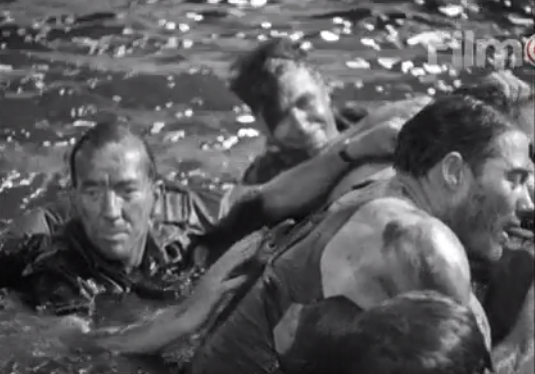Peter Berg’s Lone Survivor starring Mark Wahlberg opened wide Friday, Jan. 11, and much of the talk centers on ‘truthiness’ — were there too many Taliban, or too few, how many times did each SEAL get shot, did that ‘terminate the complications’ discussion actually take place — but despite such fact checking, the film seems like a return to the funny/sad, but possibly-inspiring Marky-Mark clusterf*ck movie genre that started around 15 years ago, a la Three Kings (1999), The Perfect Storm (2000), The Planet of the Apes (2001) and even Boogie Nights (1997). But with a lot more choreographed violence (Apes may have kept Wahlberg from being in the even more similar Ridley Scott film Blackhawk Down (2001), but co-star Eric Bana was). The ‘elephant in the room’ is not being discussed much, perhaps because many filmgoers won’t even realize that this film depicts an actual event, let alone the largest one-day loss of life in the US Armed Forces since World War II.
Which brings us to Noël Coward’s In Which We Serve (1942). It is quite a high standard to hold a ‘war’ picture to, but it does serve to give some perspective. While Berg’s film is dealing with murky, post 9-11 military objectives, Coward (with co-director David Lean, of future Lawrence of Arabia and Dr. Zhivago immortality) made his film in the midst of WWII, a much more clear-cut, good-versus-evil conflict.
You might also like: Oscar Watch: Mark Wahlberg and Taylor Kitsch push Navy Seal’s true story Lone Survivor on Hollywood insiders
However, where the professional soldier credentials and motivation of the SEALS seem to be portrayed as beyond question in Lone Survivor (as they were in Kathryn Bigelow’s Academy-winning Zero Dark-Thirty last year), Coward is more than open to also show defeat, fear and ambivalence in the faces and actions of his seamen and Coldstream Guards (In Which We Serve is also based on a book about real events, that of Coward’s friend Lord Mountbatten’s experiences.
You might also like: 3 essential Kung Fu movies by Run Run Shaw to watch now
Where neither film appears to seek to glorify war, they do seek to glorify the human fighting spirit, although inevitably Coward and Lean do with considerably more panache. Berg, however, cannot be faulted for having to work within a video-game-dominated world where it is very hard not to glorify fighting in and of itself (and see killing of the enemy solely as a score). This is why it is hard for us to face with the tragic mass loss of life in Lone Survivor, or look closely at the emotions that spontaneously emerged in this country after the announced death of Osama Bin Laden. It is too real for us.
Fortunately, there remain films that deal with such issues such as In Which We Serve, that are beautiful (there are images in here that must have inspired David Bowie and a generation of ‘New Romantic’ bands, as well as more recent groups like British Sea Power and Arcade Fire), horrifying, and yet also show us ‘what is real’ on an intuitive level.
You might also like: Mark Wahlberg vs Tom Cruise: Here’s hoping a true Hollywood feud ignites
The Living History channel is devoting special programming to the anniversary of the end of the Korean War this month. Watch now via FilmOn:
Follow TV Mix on Twitter: @tvmixusa
Contact TV Mix: editors@tvmix.com
SOURCE: TVMix.com

